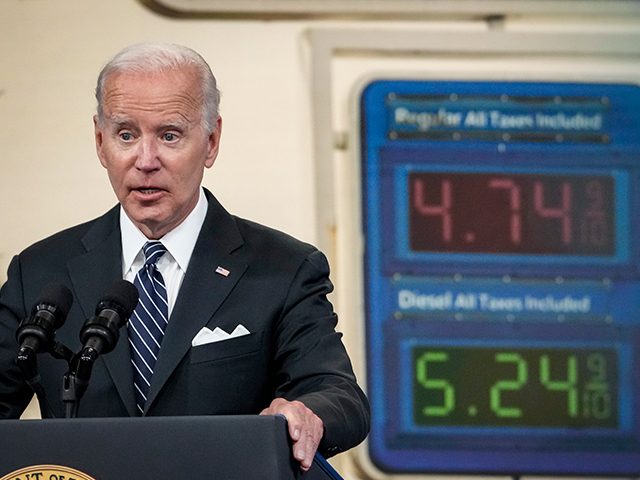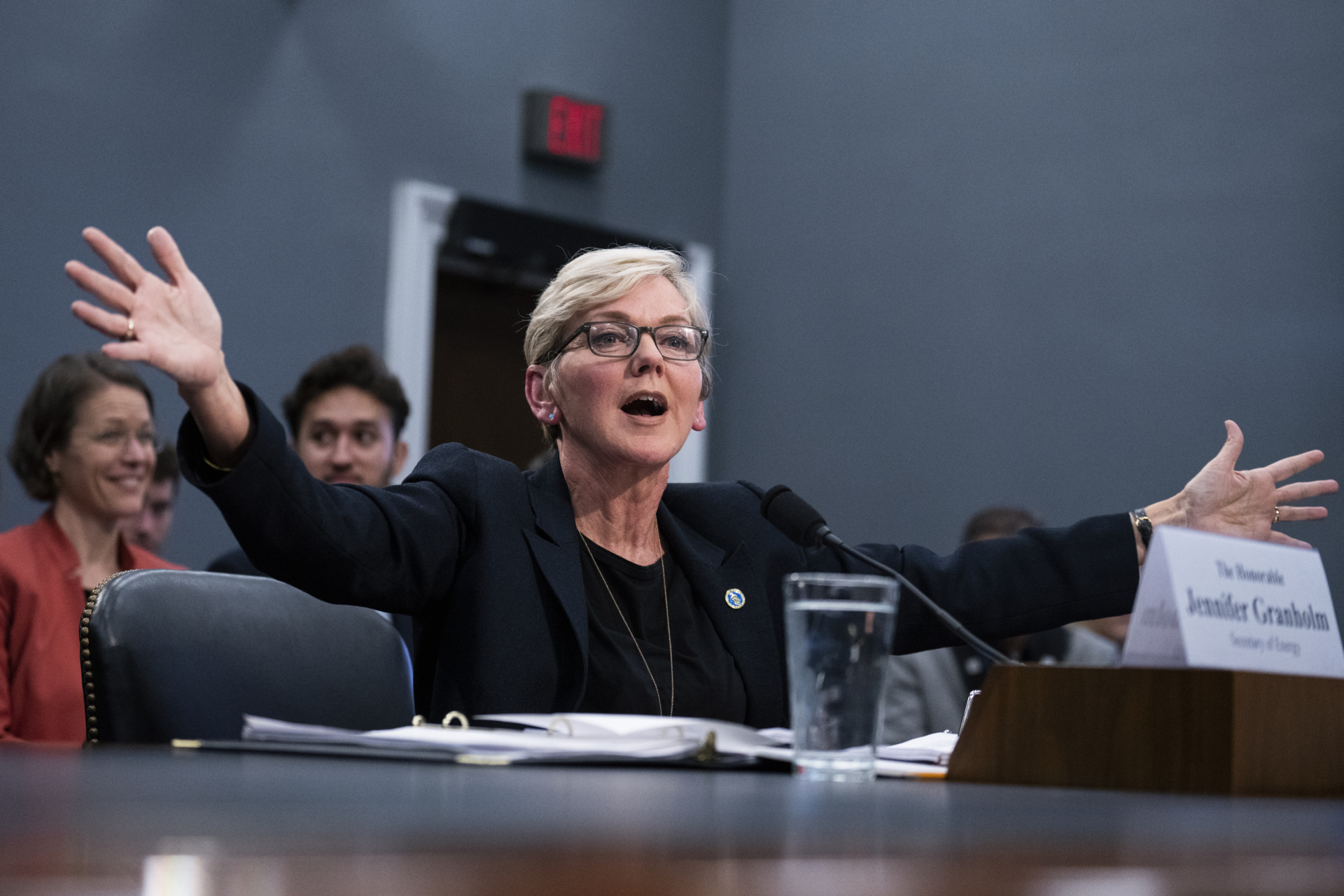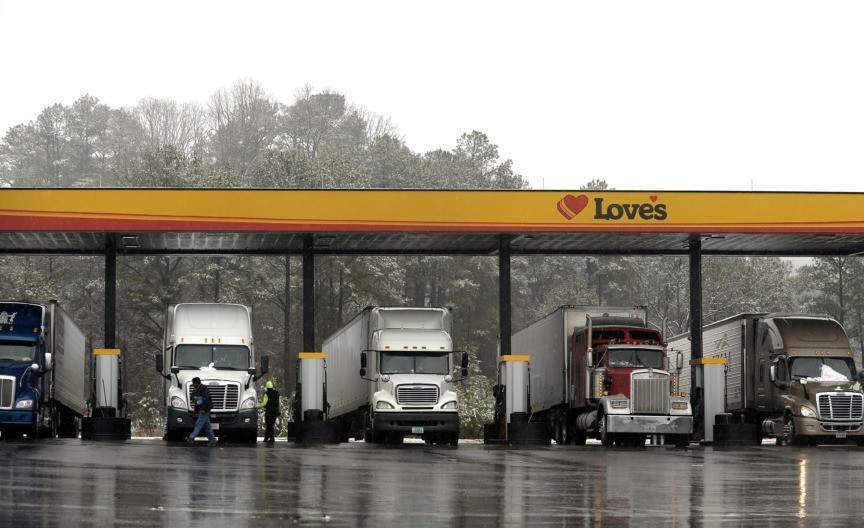Biden’s Costly Broken Promise on Oil
The disastrous energy policy of the Biden administration was highlighted this week by the unexpected announcement of an oil production cut by Saudi Arabian-led OPEC+.
Oil prices surged by as much as eight percent on Monday. Even after dipping a bit on Tuesday, largely on fears of a more sluggish economy, the price of Brent Crude is above $84 a barrel, around 7.7 percent higher than it was on Friday.
 President Joe Biden speaks about gas prices at the White House on June 22, 2022. (Drew Angerer/Getty Images)
President Joe Biden speaks about gas prices at the White House on June 22, 2022. (Drew Angerer/Getty Images)
Oil prices are predicted to keep rising. Goldman Sachs has oil reaching $95 a barrel by year-end. J.P. Morgan Chase has it going to $96 a barrel. After the Saudi announcement, some analysts pulled their estimates above $100 a barrel, perhaps as early as this summer.
That will mean higher prices at the gas pump for the summer driving season.
The surprise decision to cut crude production followed indications from the Biden administration in late March that it was not interested in imminently refilling supplies depleted out of America’s Strategic Petroleum Reserves (SPR). Energy Secretary Jennifer Granholm said in testimony on Capitol Hill last month that there were technical difficulties making it difficult to replenish the SPR.
This was widely seen as a betrayal of the implicit promise made last year by the White House to put a floor on oil prices by purchasing for the SPR when prices were low. When the Biden administration said it would sell oil from the SPR to bring prices down last year, it also communicated an intention to buy back the oil at lower prices in the future. It was setting itself up as both a seller and a buyer of last resort.
 Energy Secretary Jennifer Granholm testifies before the House Appropriations Subcommittee on Energy and Water Development on March 23, 2023, in Washington, DC. (Tom Williams/CQ-Roll Call, Inc via Getty Images)
Energy Secretary Jennifer Granholm testifies before the House Appropriations Subcommittee on Energy and Water Development on March 23, 2023, in Washington, DC. (Tom Williams/CQ-Roll Call, Inc via Getty Images)
The promise to replenish the SPR was a critical part of the plan to bring oil prices down. Without it, oil producers would likely have reacted to the additional supply coming onto the market by reducing their own production and reducing investment in future production. Foreign oil producers could accept low prices and additional supply now in exchange for additional demand in the future. Domestic oil producers could be reassured that prices would not fall so far as to wipe out investment in additional production.
Even before the OPEC+ announcement, it was clear the Biden administration was blowing whatever credibility it had on oil policy. Liam Denning of Bloomberg wrote:
Last October, following a huge drawdown in the SPR to counter the disruptive effects of Russia’s latest invasion of Ukraine, Biden proposed a rule whereby the government would buy barrels to refill it when prices were “at or below about $67-$72 per barrel.” This would, in theory, act as a free hedge to US oil producers, encouraging them to get drilling. In effect, the SPR would become a true economic buffer stock, releasing barrels when oil prices were uncomfortably high to shield consumers and buying them when they fell low enough to discourage production. Given the US has swung from being a huge net importer of oil to a net exporter, this would usefully repurpose a critical piece of public infrastructure.
The oil industry, not exactly enamored of Biden anyway, was skeptical — and he has obliged. Within six weeks, Amos Hochstein, Biden’s energy security adviser, was attaching a new condition, saying oil would need to be in the mooted price range “on a consistent basis” before repurchases could begin. He went on TV again earlier this month to reiterate the administration wouldn’t necessarily move fast. Then Granholm concurred with that to Congress. If Biden wants to build trust with producers, he’s doing a great job of trashing it.
The production cut by OPEC is more or less the formal recognition of the Biden administration's loss of credibility here.
A Lost Tool for Macroeconomic Policy
Joe Weisenthal, also at Bloomberg, pointed out in a recent newsletter that the SPR had the potential to become a powerful tool for macroeconomic management — until Biden blew it:
The Strategic Petroleum Reserve has the potential at least to be a powerful, counter-cyclical stabilizer that reduces the need for the Fed to do everything on the inflation front. But this is a novel use. And for the SPR to work in this way, it has to have some credibility that its gears can turn in both directions. It needs to be able to boost the price of oil in a slump (by being a buyer of last resort) and it needs to be able to lower the price of oil in a boom (by being a net seller). A pattern of this would bolster domestic industry and provide stability at the pump.
The US is the world's largest producer of oil, but unlike the big OPEC players, there's no national oil company. We have no real policy tool for just announcing a cut or hike in a domestic output. And now by failing to build out the SPR mechanism, it looks like despite our size in this industry, we're still outsourcing energy market stabilization to OPEC.
The likely result is not just production cuts from OPEC but effective production cuts by U.S. producers also, as investors demand capital returns rather than investment in more production.
 President Joe Biden greets Saudi Arabian Crown Prince Mohammed bin Salman at Alsalam Royal Palace in Jeddah, Saudi Arabia, on July 15, 2022. (Royal Court of Saudi Arabia/Anadolu Agency via Getty Images)
President Joe Biden greets Saudi Arabian Crown Prince Mohammed bin Salman at Alsalam Royal Palace in Jeddah, Saudi Arabia, on July 15, 2022. (Royal Court of Saudi Arabia/Anadolu Agency via Getty Images)
Is Higher Oil Inflationary or Deflationary?
Rising oil prices naturally lead to the question of whether this has an inflationary or deflationary effect on the economy.
In one sense, higher-priced energy is obviously inflationary. Energy prices are components of the inflation indexes; so increasing energy prices puts upward pressure on official measures of inflation. What's more, gasoline prices are some of the most salient expenses faced by consumers because gasoline demand is somewhat inelastic and the prices are confronted frequently. When gas prices are rising, people really feel it.
Higher petroleum prices also raises the cost of food in two ways. It is a component of fertilizer and fuels machinery used in farming. What's more, the costs of trucking food around the country are increased by higher gasoline prices. Food is the other ultra-salient category of goods that really weighs on households.
 Truck drivers stop at a gas station in Emerson, GA, on Feb. 11, 2014. (AP Photo/David Tulis)
Truck drivers stop at a gas station in Emerson, GA, on Feb. 11, 2014. (AP Photo/David Tulis)
In an environment that is positive for domestic oil production, higher oil prices can also contribute to investment and job creation. That's not a situation that applies to the current surge, for the reasons explained above.
On the other hand, money spent at the gas pump is money that cannot be spent on other goods and services. Higher gasoline prices act as a tax on the rest of the economy, lowering demand for other products. On the whole, evidence from past experiences with high oil prices suggests that this effect more than offsets the upward pressure on prices. So, the overall effect is likely to be more deflationary.
